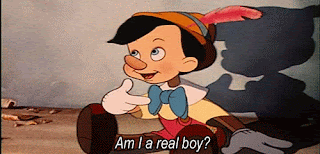Zachary McClellan's Blog
February 9, 2020
Be Real, Not Ideal.
 Sitting in a hunting stand this past winter, the wind burning my face as I waited for a deer to wander through my sights; I had a lot of time to think. It was actually much more time than I would have liked. I would have hoped to have been distracted by a parade of white-tail deer shuffling through my firing lanes, but that was not the case.
Sitting in a hunting stand this past winter, the wind burning my face as I waited for a deer to wander through my sights; I had a lot of time to think. It was actually much more time than I would have liked. I would have hoped to have been distracted by a parade of white-tail deer shuffling through my firing lanes, but that was not the case.Actually, only three does (female deer) ever came into view. Two of them were small, yearlings perhaps, but one, possibly the mother of the other two, came to a halt no more than twenty yards from me and stopped to sniff around in the partially showing grass for a snack. I sat there and watched her poke around for a moment, hoping that she would grow a six-to-ten point set of antlers before my eyes. She didn't.
As I watched her, I couldn't help but notice that the deer was beautiful and graceful (and very likely delicious). I stared at the soft brown coat and smooth movements, holding my breath in hopes to not frighten the animal.
Then, it occurred to me... I never think this way about human beings. If I saw a mother of two sniffing the sidewalk all graceful like, I would probably post a picture of it on Facebook accompanied by a snarky comment. That would make sense, though. Humans don't usually sniff the ground. If they do, I feel that they likely deserve whatever social media backlash follows the activity.
However, the more I thought about it, the more I realized that the only times that so many of us appreciate the human body is when we envy it or can gain from it. Culturally, generally speaking, we praise guys with big muscles or the incredibly athletic. We worship women with long legs, big boobs, and an ample backside. And, though many of us wouldn't admit it, our bodies are now seen as assets to a further goal. If you have certain sets of features, throw a picture on Instagram with a few hashtags and watch how many likes you get.
Though many have concocted this idea to be the reality, the simple truth is... it isn't real. The human body is as disgusting as it is beautiful. Things like gas, bloating, snot, and sweating is much more real and much more common than bulging cleavage, big butts, and bicep veins (that I simply can't get to emerge...).
What is my point?
Write about the real, not the ideal. I once wrote a blog that encouraged writers to create bold characters. When we hear the word "boring", many of us jump to the fat, lazy guy who sits on the couch all day, but do you know what is truly boring? An idealized person. Someone who never struggles. Someone who doesn't seem to face the inner-demons that the rest of the world faces. That is boring. I would rather read about the guy on the couch than an idealized human. Why? Because the guy on the couch is relatable. The perfect specimen is not.
I can guarantee you that Harry Potter and Katniss Everdeen would not be near as engaging if their first instinct and action were to always do the right thing and have no quandaries about it.
There are some of you reading this right now, who probably think I am off-base. You are probably saying to yourself "But the touched-up Instagram photos get thousands of likes, and my book about the grasshopper with a drinking problem has only sold three copies!"Well, yes. People like to look at the ideal. They may even fantasize about or envy it, but they don't want to invest in it. And, when you read a character's story, you are investing in them. You are giving hours of your life to read the story of someone/something, real or fake. Time is a great investment and it is saved for the real, not the ideal.
Unfortunately, no one may want to dive into the life of your alcoholic grasshopper either. The sad truth: it is vastly more difficult to make a sale than it is to give a quick pitch. An idealized story will easily nab some quick interest, but a real story takes time and investment. It's hard. It's real.
... But it's worth it.
Happy Writing!
Published on February 09, 2020 08:57
When Your Work Sucks, But Not Really...


 Today I was doing my final edit on my book (so close to done with the editing!!!), and I thought to myself "This is pretty good!"
Today I was doing my final edit on my book (so close to done with the editing!!!), and I thought to myself "This is pretty good!"This was an odd thought to shoot into my head. For the past several days of editing, I had thoughts like "this sucks" or "should I scrap this and start over?" So, as you can imagine, it was a pleasant surprise to be satisfied and even thrilled with my writing.
I have performed in several plays in the past, and my thought process over the last week has reminded me of the acting process.
I remember, on so many different occasions, feeling like my performance was doomed to fail. I would often feel this way all the way up through the first performance. Then... the audience laughs, or claps, or sighs; and then you know that you have drawn them in. All of your self-conscious thoughts and fears dissipate, and you become just as lost in the performance as the audience is.
With writing, I have found that the apprehensions and insecurities about your work are very similar to that of performing, but multiplied by a million (maybe a little dramatic).
You see, when you are performing, you have the other actors, director, tech staff, etc... to criticize, compliment, and encourage your performance. When you are writing, it is all happening in your head. You may have a few others to spur you on, but probably not until you are finished... and... this intimate group is likely going to be prone to sugarcoat their statements.
Here are a few things that have helped me appreciate my work even when I am feeling like it sucks...
1. Don't judge your work half-way through.
As I have learned, writing changes drastically from your first draft to your last. My book is entirely different from the original draft. I completely scrapped the beginning, changed the flow, altered the characters, reworded the conversations, and so on.
If you were performing, you wouldn't want an audience to judge your final performance based on where you were in your first read-through. Reserve your judgement for your final product.
2. Your critique is not really the one that matters.How many actors have we heard say "I hate watching myself on screen."
Anthony Burgess, in response to the acclaim of A Clockwork Orange, said that he wished it would not have been so well received. He truly did not feel as though it deserved such a great response, and that other stuff he wrote was much better.
Bearing that in mind, it is completely normal to feel apprehensive about your creative work. I mean, think about it. You are displaying an intimate piece of yourself in public. That is scary.
But... it is not your opinion that matters. Typically, you are always going to be your harshest critic. But, your work can and will strike others in a different way (maybe not always good, but you can't win them all). One reader may track with you all the way through, while another may get something far from what you intended. The bottom line is... the critique you should listen to is your readers'.
3. Don't listen to your readers.
Ahhhh... see what I did there? I told you to listen to your readers, but now I am telling you not to! What could I possibly be up to?!
I will tell you.
When it comes to compliments and constructive criticism, you want to listen. But there are those bitter, jaded types who are just seeking to take the wind out of the sails of others. Why? I don't know, but they are out there. You can expect to run into them if you get your book out there whatsoever.
Listen to your fans, not your haters. I hate the word "hater", but it is relevant here. Your fans, even if they don't like your book, can give you constructive criticisms, and if they love it they will praise you.
4. Be proud of yourself.Look... whether your book is great or absolute trash, you wrote a book. You spent days, weeks, months, and even years creating a story out of your own brain.
Not everyone can do that. And... not everyone that can do that, will do that. Not even close.
As cheesy and cliche as this may sound, you have accomplished something. Something hard. Something that takes dedication, persistence, honesty, courage, and a little delusion.
I am a strong proponent of the idea: if you want to do something, pursue it! No one can take writing away from you. No one can take performing away from you. If you love it, do it. Period.
...
As long as it helps you grow, and isn't spiritually or ethically disgraceful. Period.
...
And... as long as you don't make others, who are unwilling, foot the bill for your life. Unfortunately, we still have to live in the real world. Period.
Published on February 09, 2020 08:40
February 8, 2020
Writing: Be a Lion; Not a Lamb.
 I am someone who is quick to apologize.
I am someone who is quick to apologize. If I bump into someone, if I am standing in their way, forget to hold the door for them, etc. I am very quick to apologize. In fact, I apologize so much that my wife has repeatedly told me to stop apologizing so much. Apparently, it isn't necessary to apologize for not doing something before people ask you to do it. who knew...
I have since been working on my overuse of the words "I'm sorry", and I have found that writing stories has been helpful.
When you write a story, you want it to say something. You want it to send a message. Whether it is as simple as good vs. evil, or something as complex as political idealism, you want your story to send a message.
Unfortunately, at least for me, your message will never take shape if you are too busy worrying about possibly offending members of your audience.
J.K. Rowling had people burning her books. Suzanne Collins met opponents her violent themes when crossed with adolescents. Stephanie Meyer deserves every bit of criticism that she recieves. Making sparkly vampires popular has been the bane of our society.
You see... she doesn't care that she offended me with the Twilight series.
Whether it is the message, the elements, or minor themes; you are going to have critics... maybe even insulting, childish little toads who can't separate you from your story.
To create your best story, you need to put your critics out of your mind and write. Write in a manner that is true to yourself, honest, and gritty. In your first draft, don't pull a single punch. Hit, and hit again. If it is too harsh, you can always downplay in your edit if you have to.
If you are like me, and you apologize way too much, here are a couple of thoughts to help you write your true story.
1. Unapologetic Bravado is Popular.
In our culture, everything from our leaders to our viral videos celebrates those who will make a statement and then stick to their guns. Whether they are sticking up for what is right, or just digging themselves into a deeper hole, those who fight for their beliefs are admired and hated, but they are talked about. Talked about a lot.
So, if you struggle to say the cutting things, even if you believe strongly in them, don't worry. Your story will be better if you can even fake an unapologetic stance.
2. Weak-Willed Characters are Boring.
Imagine if Harry Potter apologized every time he did something wrong. Imagine if Katniss Everdeen doubted herself so much that she let Alma Coin have things her way. The stories would have been horrible. We wouldn't have cared enough about the main characters.
I am not saying that weak-willed people are boring, but characters are different. We can think we know a character, but we are only shown a limited amount about them, and they are in very specific situations. There is not enough room in a book to make a weak-willed main character interesting.
At the end of the day, your character has to have a spine at some point in your book. Even if they are acting against their instincts, they have to be able to stand up for themselves. Do it for your book.
3. Think About Your Message.
When you write, think about your message. Don't think about how people will view your book when you are writing. Think about the message. You and your story will be far more interesting to both your fans and critics.
You know the saying, "If you don't have anything nice to say, don't say anything at all." Ignore it. At least when you write. A book is not a dinner party.
If you don't want to offend anybody, don't write a book. Make cat posters or something.
The bottom line is this: when you write, do it for you at first. You write the message that you want to tell. Once you have your message, then you gear it toward your audience.
You need to be sure to make sure your reasons for your story are well thought out, but don't soften your message for a critic.
Keep writing!
Published on February 08, 2020 20:54



